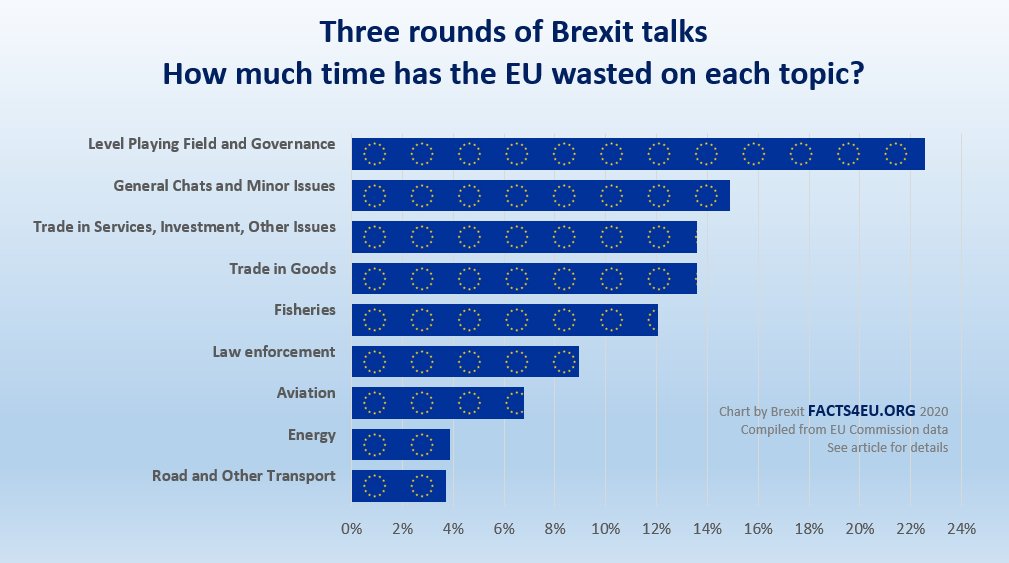Are Brexit trade talks all over bar the shouting?
“Ding ding, end of Round Three” - We reveal what the EU has been wasting time on

© Brexit Facts4EU.Org 2020
The shocking truth about the EU’s “trade” negotiations with the UK
Yesterday saw the closing session of the third round of Brexit trade talks with the European Union. Below we bring readers an exclusive analysis and summary:-
- Which topics have been discussed?
- And how long has been spent on each?
- How did each side characterise the current deadlock yesterday?
Brexit Facts4EU.Org Summary
The talks so far, overall
- Round One: 02-05 Mar; Round Two: 20-24 Apr; Round Three: 11-15 May
- Please note that these dates include short opening and closing sessions which were not full days
- Excluding opening and closing sessions, UK and EU negotiators have met on eight days in two and a half months
- Around 200 people have been involved
What have they spent most time on?
- The “Level Playing Field” and “Governance” issues have consumed the most time
- Only 44 hours (less than 14% of the time) has been spent on negotiating trade in goods
- Likewise, less than 14% of the time has been spent on negotiating trade in services and investment
- Fisheries has racked up an impressive 12% of the total time spent
© Brexit Facts4EU.Org - click to enlarge
Our chart above is reinforced by David Frost’s opening salvo in his post-talks statement yesterday:-
“The major obstacle to this is the EU’s insistence on including a set of novel and unbalanced proposals on the so-called “level playing field” which would bind this country to EU law or standards, or determine our domestic legal regimes, in a way that is unprecedented in Free Trade Agreements and not envisaged in the Political Declaration.”
About the timings of the talks
The agendas for each of the three sessions have been drawn up by the EU, not the UK.
Statistical note: As far as we are aware, none of the participants in these (supposed) trade talks have kept a stopwatch running during each session, so we have relied on the various agenda programmes in analysing how much time has been spent in each area.
The war of words yesterday, at the end of Round Three
1. David Frost, UK Chief Negotiator:
“We have just completed our third negotiating round with the EU, once again by videoconference. I would like to thank Michel Barnier and the negotiating teams on both sides for their determination in making the talks work in these difficult circumstances.
“I regret however that we made very little progress towards agreement on the most significant outstanding issues between us.

“It is very clear that a standard Comprehensive Free Trade Agreement, with other key agreements on issues like law enforcement, civil nuclear, and aviation alongside, all in line with the Political Declaration, could be agreed without major difficulties in the time available. Both sides have tabled full legal texts, there are plenty of precedents, and there is clearly a good understanding between negotiators.
“The major obstacle to this is the EU’s insistence on including a set of novel and unbalanced proposals on the so-called “level playing field” which would bind this country to EU law or standards, or determine our domestic legal regimes, in a way that is unprecedented in Free Trade Agreements and not envisaged in the Political Declaration. As soon as the EU recognises that we will not conclude an agreement on that basis, we will be able to make progress.
“Although we have had useful discussions on fisheries on the basis of our draft legal text, the EU continues to insist on fisheries arrangements and access to UK fishing waters in a way that is incompatible with our future status as an independent coastal state. We are fully committed to agreeing fishing provisions in line with the Political Declaration, but we cannot agree arrangements that are manifestly unbalanced and against the interests of the UK fishing industry.
“It is hard to understand why the EU insists on an ideological approach which makes it more difficult to reach a mutually beneficial agreement.
“We very much need a change in EU approach for the next Round beginning on 1 June. In order to facilitate those discussions, we intend to make public all the UK draft legal texts during next week so that the EU’s Member States and interested observers can see our approach in detail.
“The UK will continue to work hard to find an agreement, for as long as there is a constructive process in being, and continues to believe that this is possible.”
2. Michel Barnier, European Union Commission’s Chief Negotiator:
Monsieur Barnier’s remarks are always very lengthy compared to the succinct reports of David Frost. In this case we are talking 2,414 words from the EU side versus 386 words from the UK side.
Instead of reprinting his words we are therefore linking to Monsieur Barnier’s report here.
Observations
Even a cursory read of Michel Barnier's statement confirms our opinion that there is currently not the slightest chance that a trade deal will be agreed with the EU. As things stand, it would not matter if the Transition Period were extended for five years - the sides are too far apart. Our longest-standing readers know that we have argued since before the EU Referendum that the EU would not do a sensible trade deal with the UK. For the EU zealots in Brussels this is about their extremist ideology, not business, jobs and livelihoods.
Readers may find some of our time analysis of the Brexit “trade” talks surprising. We suspect that most people in the United Kingdom – insofar as they know much about these talks at all given the BBC’s obsession with the Coronavirus – will assume that these talks are about trade.
These talks are mostly not about trade as most people would understand it
All international trade talks these days seem to have spiralled out of control, with bureaucrats instead of business people conducting them. Business folk would get straight to the heart of the matter: the terms of trade between the two parties. Bureaucrats – especially Eurocrats - want to talk about global controls, societal issues, and combining ideological aspirations, amongst other things.
David Frost and Boris Johnson continue to show the bulldog spirit
Readers will remember the supine incompetence of the Theresa May administration and its negotiating team, from 2016-2019. Years of dealing with these embarrassing people has clearly left the EU thinking that it can adopt similar tactics with the Johnson administration. How wrong they have been.
We thoroughly welcome the robust, intelligent approach of David Frost and his team and it is clear that this has the full backing of the Prime Minister.
Will the Eurocrats get it?
The EU has a massive goods trade surplus with the UK which came to €124.4 BILLION last year alone. (Approx £111 billion GBP.) It might be assumed that the EU would wish to keep this lucrative trade going. The Rt Hon Sir John Redwood MP amongst others has frequently pointed out what a generous offer the UK has made in this regard.
Instead it seems that the EU apparatchiks would rather spend their time talking about all manner of touchy-feely nonsense, as well as making absurd demands which no right-minded country anywhere in the world would accept – unless perhaps if it had been defeated in battle.
Only six weeks to go - Will talks collapse next month?
In just over six weeks’ time the EU and UK will either have to agree to extend the Transition Period beyond 31 December this year, or not.
Built into the Withdrawal Agreement signed by the Prime Minister in January is the date of 30 June. This is the deadline for agreeing an extension to the Transition Period – something which the EU is now desperate to see. It is also the deadline for a new fisheries agreement.
The Government is so far showing no signs of wishing to extend, but then we’ve all been here before. It is absolutely imperative that the Transition Period and the UK’s current colony status ends as early as possible, and certainly no later than 31 December this year. We are still paying the EU vast annual sums, and we are still under the jurisdiction of the EU’s Court of Justice, but with no votes and no say on anything. This travesty must end.
If you believe in free speech and in a fully-free and independent United Kingdom, please make a donation towards our work today. We assume donations are completely confidential unless you tell us otherwise. Quick and secure methods are below and you’ll receive a nice thank you email from one of the team. We can’t do this without you and we really must see this thing through after all this time.
[ Sources: No.10 Downing Street media dept | EU Commission ] Politicians and journalists can contact us for details, as ever.
Brexit Facts4EU.Org, Sat 16 May 2020
Click here to go to our news headlines
And please scroll down to COMMENT on the above article.
Since before the EU Referendum, Brexit Facts4EU.Org
has been the most prolific researcher and publisher of Brexit facts in the world.
Supported by MPs, MEPs, & other groups, our work has impact.
We think facts matter. Please donate today, so that we can continue to ensure a clean Brexit is finally delivered.
Paypal Users Only - Choose amount first
Quick One-off
Monthly



Something to say about this? Scroll down for reader comments